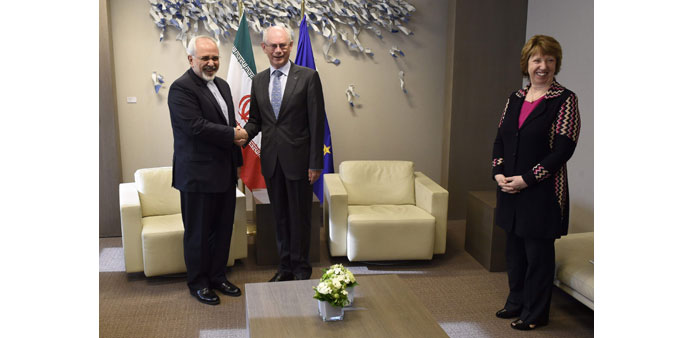Outgoing European Union Council president Herman Van Rompuy, Iran’s Foreign Minister Mohamed Javad Zarif and EU foreign policy chief Catherine Ashton meet yesterday at the EU headquarters in Brussels.
Reuters
Brussels
Iranian Foreign Minister Mohamed Javad Zarif voiced optimism after talks with European Union foreign policy chief Catherine Ashton yesterday that a dispute over Tehran’s nuclear programme can be resolved by a November 24 deadline.
“I am quite optimistic after discussions with Lady Ashton that we can in fact resolve this issue in time,” Zarif said after what he described as “good” talks with Ashton.
“I hope with the readiness and political will that I see in all parties to this discussion to have a resolution within the next three months,” he told a news conference following separate talks with Belgian Foreign Minister Didier Reynders.
However, he cautioned that reaching an agreement “requires political will, it requires full awareness of the need to address the issues rather than simply domestic constituencies”.
Iran and global powers are working to strike a comprehensive agreement by the November 24 deadline, under which Iran would curb its nuclear activities in exchange for an easing of economic sanctions that have crippled its economy.
An earlier deadline of July 20 was missed.
Western countries suspect Iran’s programme is aimed at seeking the capability to build a nuclear bomb, while Tehran insists it is peaceful.
Ashton co-ordinates the position of the six powers negotiating with Iran - the United States, Britain, Russia, China, France and Germany.
The next round of talks between the six powers and Iran is scheduled to be held on the sidelines of the UN General Assembly in New York later in September.
The United States on Friday penalised a number of Iranian and other foreign companies, banks and airlines for violating sanctions against Tehran largely tied to the decade-old dispute about its nuclear programme.
Iranian President Hassan Rohani said on Saturday the new US sanctions were against the spirit of Tehran’s nuclear negotiations with world powers.
Zarif described the new sanctions as “impediments to progress” in the nuclear talks.
“Behaviour that has been exhibited by some countries, including the United States, in imposing new sanctions, has been certainly a less than positive indication for progress.”
“But we are nevertheless committed to making progress and with Lady Ashton today we discussed both the time frames as well as the issues that are involved,” he said.
The EU issued no statement on Zarif’s talks with Ashton.

